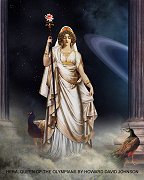
Hera
CLICK
TO ENLARGE
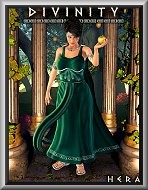
Hera
CLICK
TO ENLARGE
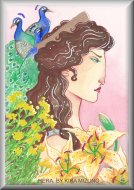
Hera
CLICK TO ENLARGE
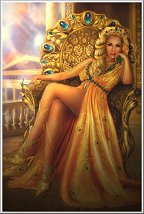
Hera by Liliaosipo
CLICK TO ENLARGE
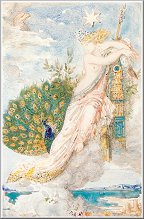
Hera by Moreau
CLICK
TO ENLARGE
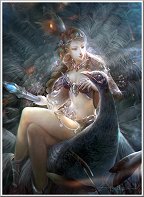
Hera
CLICK TO ENLARGE
|
HERA PAGE TWO
(continued from Page One)
Despite the important role Hera played in religious circles, her
mythological role is usually that of jealous wife and shrew. In
only one myth is she shown as a noble and gracious protector of
heroes and inspirer of heroic deeds, and that was when she
assisted Jason and the Argonauts in their Quest of the Golden
Fleece.
Not that you could blame her - Zeus was anything but a faithful
husband, so Hera in her turn was not a loyal wife. In fact, when
he was young, Zeus drove his wife so mad with his antics that
she convinced the other gods to join in a revolt against her
husband.
Her part was to drug Zeus until he was unconscious, and she did
so successfully. The scheming gods then took away the King of
the Olympians' fearsome thunderbolts and bound the sleeping Zeus
with rawhide thongs to a couch, taking care to tie 100 strong
knots so that he could not move.
They had not, however, planned what to do next and began to
quarrel over who would take Zeus’ place. Their leader awoke and
threatened his wife and the other mutineers with certain death
unless they immediately released him, but they had placed his
thunderbolts out of reach and just laughed at him.
The Nereid Thetis saw the Olympians arguing over the leadership
and knew that a civil war was about to break out on Olympus. She
hurried in search of the hundred-handed Briareus, whom Zeus had
freed from the prison of Tartarus, and snuck him into the
palace.
Still full of gratitude to Zeus, Briareus was more than happy to
come to his master's help and, using every hand at once, was
able to quickly untie the hundred knots. Before the quarrelsome
gods knew what was happening, Zeus sprang from the couch and
grabbed his thunderbolts.
As the gods fell to their knees begging and pleading for mercy,
he seized Hera and hung her from the sky with gold chains. To
further punish her, Zeus tied heavy anvils on her feet to weigh
her down. In excruciating pain she moaned and groaned all night
but none of the others dared to help her.
For four days and nights she was suspended from the sky, but her
loud weeping kept Zeus from falling asleep and finally he agreed
to release her if she would swear to never again rebel against
him. She had little choice but to agree.
While Hera never again rebelled, she was still vexed by his
infidelities and often intrigued against Zeus's plans, managing
to humiliate him on more than one occasion.
Hera was the goddess of marriage and protector of married women.
Her sandals and chariot were made of pure gold, crafted by her
son Hephaestus. He also designed her splendid throne, described
here in fine fashion by Robert Graves, from his wonderful
book, Greek Gods and Goddesses:
"Queen Hera had an ivory throne, with three crystal steps
leading up to it. Golden cuckoos and willow leaves decorated the
back, and a full moon hung above it. Hera sat on a white cow
skin, which she sometimes used for rain-making magic if Zeus
could not be bothered to stop a drought...she was his Queen, and
perpetually young and beautiful."
Some of the more famous victims of the wrath of Hera included
the greatest Greek hero, Heracles (Hercules),
whom she tormented relentlessly; Semele, mother
of Dionysus, god of wine, as well as Dionysus himself and his
parents, whom she caused to go mad; Leto,
mother of Apollo and Artemis; Lamia, all of
whose seven children, save for Scylla, Hera killed in a fit of
jealousy; Echo, who could no longer use her
voice in punishment, except in foolish repetition of another's
shout; the seer Teiresias, whom she blinded for
saying that women enjoyed sex more than men; Io, who
was changed into a cow and tormented by a gadfly sent by Hera; Callisto, who
was turned by Hera into a bear, leading to her tragic death; and
many, many more...
But Hera did help Hippodameia find happiness through marriage to
Pelops; this began the Heraean Games, as Robert Graves tells us
in The Greek Myths:
"In gratitude to Hera for facilitating her marriage with
Pelops, Hippodameia summoned sixteen matrons, one from every
city of Elis, to help her institute the Heraean Games. Every
fourth year, ever since, the Sixteen Matrons, their successors,
have woven a robe for Hera and celebrated the Games; which
consist of a single race between virgins of different ages, the
competitors being handicapped according to their years, with the
youngest placed in front. They run clad in tunics of less than
knee length, their right breast bared, their hair flying free.
Chloris, Niobe's only surviving daughter, was the first victrix
in these games; the course of which has been fixed at
five-sixths of the Olympic circuit. The prize is an olive
wreath, and a share of the cow sacrificed to Hera; a victrix may
also dedicate a statue of herself in her own name"
Despite her often-ridiculous mythological characterization,
Hera's role in the religion of the day was great. She was
venerated in every home and Ilithyia (or Eileithyia), who was
the goddess of childbirth, was her daughter.
Her worship was fervent and extensive, particularly at Samos and
Argos, and her divine position as the goddess of women and
marriage was accepted throughout most of Greece. Keep in mind
that Hera was actually the only married woman among the
Olympians, for Aphrodite's 'marriage' to Hephaestus can hardly
be called legitimate, because it was an arranged marriage with
no commitment or loyalty.
In appearance, Hera is usually represented as a majestic woman
of mature age, with a beautiful forehead, large and widely
opened eyes, and with a grave and stern expression that commands
reverence.
Her hair was adorned with a crown or a diadem, with a veil
frequently hanging down the back of her head, to characterize
her as the bride of Zeus.
Her animal is the cow, the most motherly of animals, but not
wanting to be thought of as plain-looking, she also adopted the
lion as her symbol, and the peacock and the cuckoo as her birds.

[home] [page one]
[page two]
|







